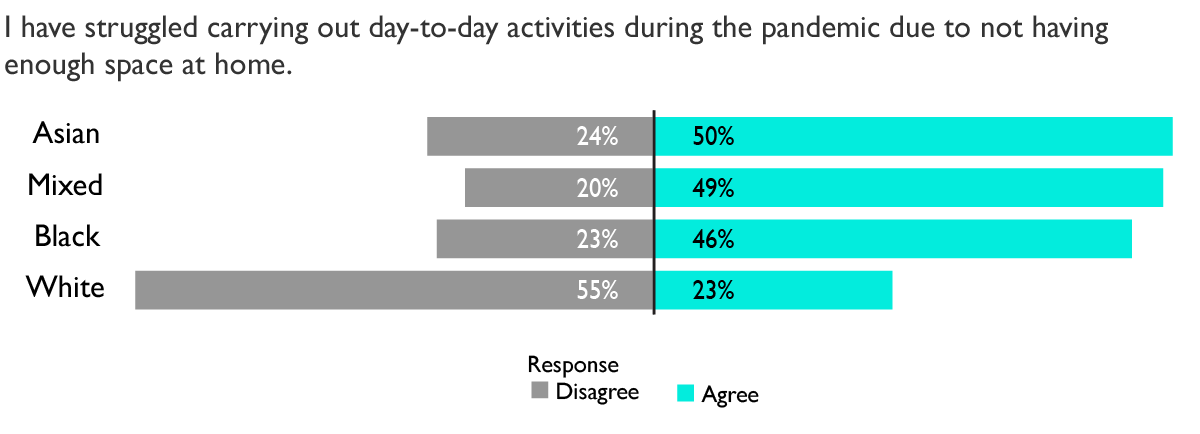Different crises
Where do you see compounding crises and how are these playing out in different communities?
What fault-lines have you seen emerge or become clearer as a result of the pandemic?
We still have systems of education, healthcare, work and public service predicated on what worked for 18th century manufacturing rather than the networked and digital 21st century.
Covid-19 has ruptured that, revealing the shortcomings of many of our customs and practices as well as deeper social, political, ecological and economic inequalities.
These fault-lines were previously hidden to many and ignored by others but are now revealed more widely.

Covid crisis has produced fissures in our globalised, industrialised civilisation. We should drive the cracks open as much as we can, resist forces that will want us to go back to the way it was.
"Compared to where we were, as a society, I would suggest five, even certainly, 10 years ago, people rarely, if ever talked about mental health related conditions in the same ways they talk about, I don't know, having flu, or God forbid, breaking an arm or whatever it might be. And I think possibly, there's been a much greater focus, and people have felt more comfortable, if that's the right word about talking about some of those very real challenges that I think a lot of people face...and faced probably before all of this, but it's been exacerbated by this."
Birmingham Resident
“The sense of shock at the scale of Covid-19 crisis especially what has happened in care homes and those older and vulnerable people who have been cared for, looking ahead to what lasting impact will be.”
Andrew Cooper, Sovereign Housing Association
“We have debunked myth about how quickly we can act.”
Attendee at event for members of civil society organisations
“Volunteers are depleted, and so is the income for community and voluntary organisations - 70-80 percent of their incomes... All that income has gone, but the volume of the work and the need has gone up more than ten, twenty times. They’re doing it on good will, but they're completely depleted, and some are filing for bankruptcy, they can’t continue any more...”
Samira Ben Omar, co-founder Community Voice, North West London
Maaria Mahmood, Director, Muslim Youth Helpline
Members of minority ethnic groups were more likely to report struggling to carry out day-to-day activities during the pandemic due to not having enough space at home with approximately half of Asian (50%) and Black (46%) respondents and respondents from mixed ethnic backgrounds (49%) reporting this as an issue compared to 23% of White respondents.

These groups were also more likely to face discrimination when accessing local services. Approximately half of Asian (50%) and Black (52%) respondents said they experienced discrimination due to ethnicity, religion, gender of sexuality compared to 19% of white respondents.

“The fact the market has all but failed locally and land values are low has meant for years that we have almost no chance of competing for funding against areas with more buoyant markets. As a result, residents of places like Worksop feel their areas have moved from being forgotten to simply abandoned.”
David Armiger, assistant chief executive Bassetlaw District Council
“Hundreds of thousands of UK households now use food banks. Comprehensive figures for all services are not available, but judging by data from organisations working with food redistribution charity FareShare, the full number of families turning to charity food aid may exceed a million. This would have been unimaginable a decade ago. However, such services are still only used by a minority of low-income families.”
Wolf Ellis, King’s College London, 11 March 2021
“The Covid-19 pandemic and the public health response to it have radically changed life in the UK. There are two particular trends that have been responsible for changes to inequalities in education, skills, and incomes. First, the shutting down of many sectors of the economy during in lockdowns and social distancing measures have led to stark changes in the labour market. Second, the lack of face-to-face teaching in spring 2020 and again in early 2021 has massively disrupted the education of all children.”
Institute for Fiscal Studies Deaton Review, 'Inequalities in education, skills, and incomes in the UK: The implications of the COVID-19 pandemic'
“If paradise now arises in hell, it’s because in the suspension of the usual order and the failure of most systems, we are free to live and act in another way.”
Rebecca Solnit, A Paradise Built in Hell (2010)
“We may be entering a grim, involuntary social experiment revealing which everyday habits and practices we’d miss if they were gone, and which could be swept away surprisingly easily… If the need to share work around during the great depression helped kill the six-day week, this virus may knock another brick out of the wall of Monday to Friday working.”
Gaby Hinsliff, The Guardian, 13 March 2020
Where do you see compounding crises and how are these playing out in different communities?
Where and how has the pandemic exacerbated existing issues?
Is it a concern that so much funding has been found by government - yet universal credit has only been temporarily uplifted by £20 and it took a sustained campaign to extend free school meals?
Are there any specific temporary measures you’ve seen put in place that would cause you concern if they became the norm?
How are you finding resilience through transition to cope with discomfort and uncertainty?
Where are you seeing energy for change emerge? How can you add to it?